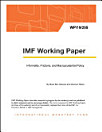The Welfare Implications of Services Liberalization in a Developing Country: Evidence from Tunisia
Mr.Nizar Jouini · Mr.Nooman Rebei
maj 2013 · International Monetary Fund
E-bok
43
Sidor
reportBetyg och recensioner verifieras inte Läs mer
Om den här e-boken
We propose an integrated method based on a two-sector small open economy dynamic and stochastic general equilibrium model to estimate non-tariff barriers and quantify the impact of services liberalization. The major component of trade barriers is explicitly modeled through the introduction of entry-sunk costs. Hence, liberalization is treated assuming a government's policy decision aimed at reducing those costs. Then, we estimate the model using Bayesian techniques for Tunisia and the Euro Area. The paper presents a precise quantitative evaluation of services trade barriers as the difference between entry-sunk costs in Tunisia versus the Euro Area. We find significant welfare benefits in addition to aggregate and sectoral growth gains the Tunisian economy could attain following services liberalization. Surprisingly, the goods sector is the one that benefits the most from services liberalization in the short- and long-term horizons.
Betygsätt e-boken
Berätta vad du tycker.
Läsinformation
Smartphones och surfplattor
Installera appen Google Play Böcker för Android och iPad/iPhone. Appen synkroniseras automatiskt med ditt konto så att du kan läsa online eller offline var du än befinner dig.
Laptops och stationära datorer
Du kan lyssna på ljudböcker som du har köpt på Google Play via webbläsaren på datorn.
Läsplattor och andra enheter
Om du vill läsa boken på enheter med e-bläck, till exempel Kobo-läsplattor, måste du ladda ned en fil och överföra den till enheten. Följ anvisningarna i hjälpcentret om du vill överföra filerna till en kompatibel läsplatta.






